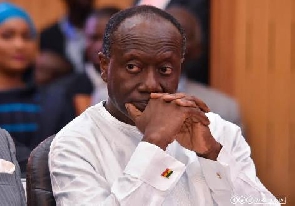Finance Minister Ken Ofori-Atta on Thursday said the Government has over the past three years adopted pro-active debt management policies and strategies that helped to reduce the rate of growth of debt accumulation and risk in the debt portfolio.
He also said that the Government institutionalized the preparation of an Annual Borrowing and Recovery Plan, to inform the investor community about Government’s financing plan for the fiscal year.
Also, the Medium-Term Debt Strategy was realigned to the financing of the fiscal deficit and is updated or reviewed accordingly, and an annual Public Debt Report to Parliament highlighting all public debt activities for the year has also been institutionalised to promote transparency and accountability to the people.
Presenting the “Mid-year Review of the Budget Statement and Economic Policy of the Government of Ghana and Supplementary Estimate for 2020 Financial Year” to the nation through Parliament, in Accra, Mr Ofori-Atta said, the Government also improved on investor relations.
It is also constantly in touch with the investor community to expand Ghana’s access to the debt market to cater for its financing needs.
According the Minister, Government’s liability management programme for the period focused on replacing high interest-bearing instruments in the portfolio with less expensive alternatives, and a reduction of risk in the portfolio.
He said the Government implemented a credit risk assessment framework for all institutions that demand Government’s guarantee to ensure an effective reduction in risk of debt operations for covered entities.
“Mr Speaker, following from a successful completion of the IMF-ECF programme, one of the main successes is the capacity building in Government to conduct debt sustainability analysis and subsequently establishing our own public debt limits for the contracting of external non-concessional loans.
It is important to note that Ghana is one of the few countries to have initiated such fiscal and debt discipline on its own.
He added: “Subsequently, we can conclude that debt management is no more a residual policy, but an integral part of macro-fiscal management.
These developments have improved the metrics in Ghana’s public debt portfolio.
Mr Ofori-Atta said on refinancing risk, the average time to maturity in the entire public debt portfolio had improved from 7.
7 years to 9.
8 years from 2016 to 2019, but of more significance was the external debt, where the average time to maturity improved from 9.
3 years to 12.
4 years from the period 2016 to 2019.
Debt maturing in a year as a percentage of the total debt stock has reduced from 28.
1 percent to 15.
3 percent from 2016 to 2019.
The level of external debt maturing in one year as a percentage of the total external debt stock had improved from 7.
2 percent to 4.
7 percent.
He however indicated that the nation’s performance on the domestic debt stock maturing in one year which witnessed significant reduction from a high of 54.
5 percent in 2016 to as low as 28.
1 percent in 2018 saw an uptick in 2019 to 31.
7percent.
This, he said, was as a result of increased tap-ins to existing debt instruments to address the crystalisation of contingent liabilities.
On interest rate risk, the Finance Minister said the average time to re-fixing (ATR) the portfolio improved from 7.
2 years to 9.
5 years from 2016 to 2019.
For external debt, the ATR improved from 8.
6 years to 12.
0 years for 2016 to 2019; and Ghana’s public debt management programme for the 2019 financial year was successfully executed despite challenges from the global and the domestic economy.
As at end-December 2019, the total gross public debt stock stood at GH¢217,990.
7 million.
This was made of GH¢112,509.
4 million and GH¢105,481.
2 million for external and domestic debt respectively.
Click to view details



Business News of Saturday, 25 July 2020
Source: businessghana.com







![Deputy Minority Leader, Emmanuel Armah-Kofi Buah [L] and First Lady Rebecca Akufo-Addo Deputy Minority Leader, Emmanuel Armah-Kofi Buah [L] and First Lady Rebecca Akufo-Addo](https://cdn.ghanaweb.com/imagelib/pics/114/11465182.295.jpg)









